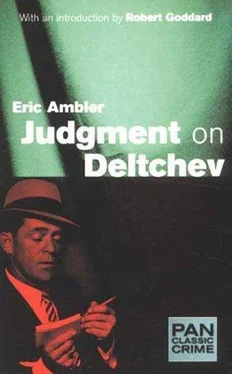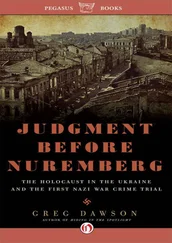Eric Ambler - Judgment on Deltchev
Здесь есть возможность читать онлайн «Eric Ambler - Judgment on Deltchev» весь текст электронной книги совершенно бесплатно (целиком полную версию без сокращений). В некоторых случаях можно слушать аудио, скачать через торрент в формате fb2 и присутствует краткое содержание. Год выпуска: 1977, ISBN: 1977, Издательство: Vintage, Жанр: Криминальный детектив, на английском языке. Описание произведения, (предисловие) а так же отзывы посетителей доступны на портале библиотеки ЛибКат.
- Название:Judgment on Deltchev
- Автор:
- Издательство:Vintage
- Жанр:
- Год:1977
- ISBN:9780307049971
- Рейтинг книги:4 / 5. Голосов: 1
-
Избранное:Добавить в избранное
- Отзывы:
-
Ваша оценка:
- 80
- 1
- 2
- 3
- 4
- 5
Judgment on Deltchev: краткое содержание, описание и аннотация
Предлагаем к чтению аннотацию, описание, краткое содержание или предисловие (зависит от того, что написал сам автор книги «Judgment on Deltchev»). Если вы не нашли необходимую информацию о книге — напишите в комментариях, мы постараемся отыскать её.
Judgment on Deltchev — читать онлайн бесплатно полную книгу (весь текст) целиком
Ниже представлен текст книги, разбитый по страницам. Система сохранения места последней прочитанной страницы, позволяет с удобством читать онлайн бесплатно книгу «Judgment on Deltchev», без необходимости каждый раз заново искать на чём Вы остановились. Поставьте закладку, и сможете в любой момент перейти на страницу, на которой закончили чтение.
Интервал:
Закладка:
He smiled unpleasantly. ‘I will speak plainly, Mr Foster. I think your behaviour here has been, to say the least of it, unethical. If you were a professional newspaperman I should make a very strong complaint both to your employers and to the British Legation here. As it is, I shall recommend to the police that you are released in the morning. However, I shall withdraw from you all facilities for attending the Deltchev trial. I also advise you unofficially to leave the country immediately — let us say by tonight’s train at the latest. In case you decide to ignore that advice, I propose to have your visa and permis de séjour cancelled forthwith. Do I make myself clear?’
I protested as convincingly as I could, demanded that an official expulsion order be issued, became angry, and finally pleaded. He was obviously and satisfactorily bored with me. It has occurred to me since that he must have been nearly as relieved as I was that the problem I represented had been disposed of. He may even have disliked the idea of having to have me killed. It is possible. The last thing he said to me could be taken that way. To stop me talking he rapped on the door to summon the escort.
When they came in he gave them an instruction and turned to go. Then he paused and looked back.
‘Mr Foster,’ he said, ‘I once saw a performance of a play of yours and I enjoyed it. Why not stay in the theatre? I think, for you, it would be much safer.’
I was taken out of the building by the way I had come in. It must have been a wing of the Propaganda Ministry. There was another ride in the van, another oppressive wait, then a cell in a police station. The cell had a bug-infested plank bed, but I was too exhausted and shaken to care much about bugs. As the patch of sky I could see got lighter, I fell into a headache-ridden doze. I even slept a little. At nine o’clock the cell door opened and I was taken to a sort of waiting room near the entrance.
There, dirty and unshaven, in his seersucker suit with the three fountain pens in the pocket and his briefcase resting on his knees, sat Pashik.
He rose to his feet as he saw me, and nodded.
‘Good morning, Mr Foster.’
‘How did you get here?’ I said.
His eyes flickered warningly in the direction of my escort. He spoke in German. ‘I have just been informed that you were arrested by mistake and were here. I understand that an apology has already been given and accepted.’
‘Yes. Am I free to go?’
‘I am told so.’
I shook hands with the escort and followed Pashik down the steps into his car. He drove off and turned a corner before he spoke. His tone was bleak and noncommittal.
‘What happened, Mr Foster?’
‘I was interrogated by Brankovitch.’
‘Yes?’
‘He wanted to find out how much I knew and how much I suspected.’
He turned to look at me. The car wandered in the direction of an obelisk.
‘If we’re going to talk hadn’t you better stop?’ I added quickly.
He straightened up but did not stop. ‘And what did you know and suspect, Mr Foster?’
‘That the Brotherhood plot to assassinate Vukashin has been taken over by the anti-Vukashin movement in the People’s Party. That Aleko has been brought in to organize the job efficiently. That Philip Deltchev was involved in the original plot and is still involved. That when Vukashin is assassinated at the Anniversary Parade today, Philip Deltchev will be executed for the crime. That the story will be that when his father was arrested Philip took over the conspiracy and with the knowledge and approval of the Agrarian Socialist Executive carried it through. That the Agrarian Socialist Party will be made illegal and liquidated. That Brankovitch will take over the government.’
He kept his eyes on the road. ‘And what did you tell him you knew?’
‘Only what he must have been already told by Aleko — that I found the body of Pazar and believed Herr Valmo’s explanations.’
‘And you convinced him?’
‘Do you think I’d still be alive if I hadn’t?’
‘No, Mr Foster, I don’t. May I say that I have always had the greatest respect for your intelligence?’
‘Thank you.’
‘You must have talked with Mr Sibley, of course.’
‘Yes.’
‘I was sure he had recognized me and that someone had been indiscreet. How much does he know, do you think?’
‘He’s got the general idea. And he’s very frightened.’
‘I see. We have much to tell each other, Mr Foster.’
‘Yes. By the way, my permit for the trial has been withdrawn and I’ve got to be out of the country tonight.’
He nodded. ‘That was to be expected. There is a train for Athens at five, which I strongly recommend.’
‘Athens? Why Athens?’
‘Because that is where Philip Deltchev is.’
I stared at him. He had a curious smirk on his face. He even began a wheezy kind of chuckle.
‘What on earth are you talking about?’ I demanded.
He swung exuberantly into the street that had the Hotel Boris in it. Already crowds were beginning to line the roads in preparation for the parade. He looked at his watch and nearly mowed down a family group in national costume.
‘It is now twenty of nine,’ he said. ‘In an hour Philip Deltchev will be at the Hotel Splendid Palace in Athens. Apart from Madame Deltchev and myself, you are the only person who knows this. You can be the first newspaperman to interview him, the first to expose the People’s Party’s political murder conspiracy.’
‘But how did you know?’
‘I think you could have guessed, Mr Foster. I saw him across the frontier myself last night.’
CHAPTER NINETEEN
When Pashik was secretly rewarded for his services to the Provisional Government with shares in and management of the Pan-Eurasian Press Service he was not unduly grateful. He had risked his life to serve a political ideal; but it was an ideal that in his mind belonged exclusively to the United States of America; elsewhere it was not valid. He had performed his service somewhat in the spirit of the prosperous immigrant to that country who endows a public library or a childbirth clinic in his native land. The act is charitable, but it is also a reparation, a propitiatory rite that makes the separation final and complete. For Pashik there was little satisfaction in the knowledge that his contribution had been so frankly and practically recognized. His pleasure in the gift resided in the fact that the agency’s clients were nearly all American and that he could feel, not preposterously, that as their representative he was in a sense an outpost of the American way of life. One day, perhaps, he would go on a visitor’s visa to America; and, perhaps one day, before he was old, he would get an immigration quota number. Meanwhile he was in touch. For Pashik, who had learned not to expect too much of life, that was a singular blessing and he enjoyed it. After a while he could almost forget that the Brotherhood had existed.
The reminder that it had indeed existed and the news that in an attenuated way it still did exist came as a blow. The messenger was Pazar. He told of cautious overtures being made, of small, tentative meetings, of wary soundings, and of half-formed plans. It was as if the Brotherhood had been decimated by a plague and as if the survivors had now begun to raise their heads and look about them, uncertain whether or not the infection still persisted. Gradually, in an atmosphere of intense suspicion and extravagant fears, contacts were being re-established. The security precautions were formidable. All surviving members were invited to reapply for membership and submit to the most searching investigation. Refusal to reapply when asked was to be deemed evidence of guilt. There had been no refusals so far, Pazar told Pashik grimly. The Brothers awaited him.
Читать дальшеИнтервал:
Закладка:
Похожие книги на «Judgment on Deltchev»
Представляем Вашему вниманию похожие книги на «Judgment on Deltchev» списком для выбора. Мы отобрали схожую по названию и смыслу литературу в надежде предоставить читателям больше вариантов отыскать новые, интересные, ещё непрочитанные произведения.
Обсуждение, отзывы о книге «Judgment on Deltchev» и просто собственные мнения читателей. Оставьте ваши комментарии, напишите, что Вы думаете о произведении, его смысле или главных героях. Укажите что конкретно понравилось, а что нет, и почему Вы так считаете.












